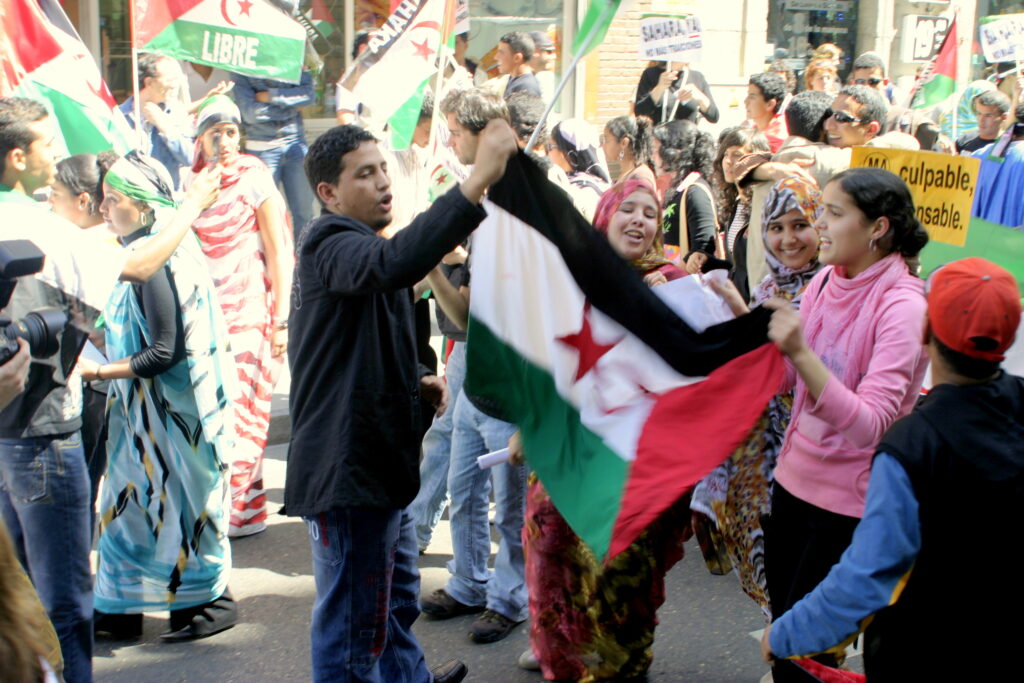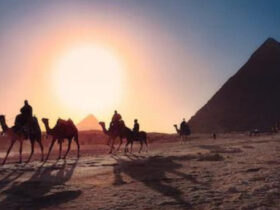Morocco’s soccer sphere recently re-entered the newswave when the Moroccan government announced it was not going to participate in the African Nations Championship (CHAN) tournament hosted in Algeria this year– a tournament they had previously won in 2021.
After not receiving authorization to fly directly into Algeria, Morocco’s decision marked only the next in a series of increasing tensions between the two countries. Algeria cut off diplomatic ties with Morocco in 2021 following the announcement of the Morocco-Israel normalization agreement and alleged Moroccan support of the Kabyle movement, a separatist group representing the autonomy rights of the ethnic Kabyle people in Algeria.
The situation precipitated on the first night of CHAN Jan. 13, when the opening speaker called for the freedom of the Western Sahara, a disputed territory bordering Morocco, Algeria and Mauritania. The statement faced direct backlash from the Moroccan government, who proclaimed the statements provocative and called for an investigation by the Confederation of African Football. However, the comments reawakened conversation regarding the status and situation of the Western Sahara, a territory which has been in a state of flux for over 50 years.
The Western Sahara has been in the realm of international policy, a largely unfinished story. Despite multiple attempts over the years to resolve the conflict and international pressure from entities such as the International Court of Justice and the United Nations, the territory touches a nerve among Morocco’s sovereignty claims and want of total independence by the Polisario Front, the organized group opposing Morocco’s occupation of the Western Sahara.
The situation has even regressed with time, the Polisario breaking a 29-year ceasefire with Morocco in the winter of 2020.
Yet as further analysis emphasizes, the conflict reaches far deeper than a border dispute, and to understand why the Western Sahara has become such a longlasting dispute it’s first important to look at its history and developments. Questions of sovereignty, ethnic identities, natural resources and regional dominance have left the territory at a very peculiar crossroads, one that has only heightened tensions between Morocco and neighboring Algeria.
History and Background of the Western Sahara dispute
Geography, native populations and Spanish colonization
Starting in the 18th and 19th century, West Sahara, home to approximately 600,000 indigenous Saharawi people,was subject to European colonization when in 1884, Spain colonized and created the artificial borders of what would be coined the Spanish Sahara—today the Western Sahara—after the Berlin Conference.
Around the same period, France and Spain started increasing presence and claims over Morocco, and it was not until 1956 that Morocco regained independence from France and started pressing for liberation from the Spanish protectorate. It was around this time that the newly independent Morocco started laying claims over what had become the Western Sahara.
The subsequent decade saw an international push for decolonization. The UN passed the Declaration on the Granting of independence to colonial countries and peoples and, in 1963, placed the Western Sahara on its list of Non-Self governing territories. However, that same year, huge phosphate reserves were discovered in the Western Sahara, increasing Spanish investment and interests in the region.
Then, in 1973, the Popular Front for the Liberation of Saguia el-Hamra and Rio de Oro (Polisario Front) was created to represent Saharawi interests by a group of university students and exiles in Mauritania and Southern Morocco. The group represented the first united effort calling for Saharawi nationalism and the establishment of an independent state for the Western Sahara following the Spanish created borders.
Impact of International Law and the Madrid Accords
The situation reached its most significant developments in terms of international status in 1974, when Spain announced its plan for hosting a UN sponsored referendum on the status of the Western Sahara. Yet there were several delays and competing discussions and the question of sovereignty was taken up to the International Court of Justice (ICJ).
The ICJ was asked to determine the strength of both Morocco’s and Mauritania’s claims over the Western Sahara, as well as Spain’s position that it was terra nullius, or nobody’s land, at the time of its colonization.
The court issued its advisory opinion on Oct. 15 the next year, finding that there was no tie of territorial sovereignty between the Western Sahara and Morocco and Mauritania. While the court recognized some legal ties formed during the periods of Morocco’s sultan presence in the land, it ruled in favor of self-determination over the territory. This ruling has been key in international law in countering Morocco’s occupation over the area.
After the opinion was released however, Morocco’s King, Hassan II, issued a radio and television address calling for people to march into the Western Sahara. What later became known as the Green March, consisted of over 350,000 people peacefully entering the Spanish-held territory. The march placed further pressure on Spain, which was in a state of flux during the end period of the Franco regime and did not want to engage in further conflicts.
This led to Madrid Accords, an agreement which announced Morocco and Mauritania would be replacing Spanish administration over the Western Sahara to determine the next steps.
Following the ICJ’s announcement, on Feb. 27, 1976, the Polisario established the Sahrawi Arab Democratic Republic government in exile and started setting up the first refugee camps in Algeria after being denied direct participation in the accords. Although Algeria has made no territorial claims over the Western Sahara, it started and to this day continues to be among the Polisario’s strongest supporters due to strategic interests and access to the Atlantic coast and fear of Moroccan expansion.
Armed conflict and failed UN Resolutions
Guerilla warfare ensued between the Polisario, Moroccan and Mauritanian forces, and in 1979, after prolonged conflict and losses, Mauritania renounced its claims over the southern half of the territory. Mauritania had recently suffered a military coup and could not sustain continued fighting in the region.
Nevertheless, fighting between Morocco and the Polisario continued until 1989, when both sides agreed to a UN ceasefire. The conflict occupied over half of Morocco’s army, who had built an over 2400 km sand wall known as the Berm to separate and hinder the Polisario’s guerilla tactics.
After the ceasefire, a series of agreements were built and subsequently failed to hold referendums and policies in the Western Sahara. Over 20 years have passed since the creation of the United Nations Mission for the Referendum in Western Sahara (MINURSO) in 1991, which aimed to plan and hold a referendum to offer the Western Sahara independence or integration within Morocco, known as the Settlement Plan. Yet the parties’ difficulty in agreeing over the identification of voters for the referendum and irreconcilable positions have led to large diplomatic failures to implement a solution.
Since, the parties have been stuck in a stalemate. Morocco introduced in 2007 its own plan, which would grant the Western Sahara autonomy but with no hope of independence by referendum and since its proposal, King Mohammed VI has remained stauch that Moroccan sovereignty over the territory is not up for negotiation.
This stagnation has led to increasing frustrations on behalf of the Polisario Front, who after Moroccan forces entered the buffer-zone of the territory in November of 2020, announced an end to the cease-fire, effectively re-flaming hostilities.
Moroccan interests
So why is Morocco so interested in the Western Sahara? Morocco’s claims and wants over the territory are generally sub-divided into two main categories: nationalistic visions and natural resources.
During the period of Moroccan independence under Morocco’s National Liberation Army, Allal Al-Fassi, considered by many as the father of the Moroccan nationalism movement, put forth the vision of Greater Morocco. The term referred to a movement for Morocco to gain back and reassert its influence over the pre-colonial Sultanate areas that encompassed the entirety of the Sahara. This area would include the Western Sahara, which according to the administration, had deep religious and legal ties with Morocco reaching back to the 11th and 12th century. Despite evolution since Al-Fassi’s original proposal, much of Morocco’s rhetoric towards the Western Sahara originates from this standpoint of reuniting and taking back what it argues was and remains an integral part of the Kingdom.
However, multiple international entities have denounced these subsequent claims, finding that the peoples of the Western Sahara had founded and established their own shared ways of life and system of organization.
The Polisario has also accused Morocco of taking advantage of its natural resources. Control over the Western Sahara would give Morocco un-breached access and power over territory’s large phosphate reserves. Just in 2016, Morocco announced it was launching a $1.8 billion investment plan in the Western Sahara.
In addition to phosphate reserves, the territory also has significant access to fishing resources along its coastline, and debates over trade agreements have sparked intense outrage. Just in 2018, the European Court of Justice struck down a fishing agreement between the European Union and Morocco because it included the Western Sahara territory. The Western Sahara has been reported as having rich coastlines, making it appealing to many international and regional actors.
Humanitarian crisis and aid
Since the conflict resumed, questions regarding the well-being and status of the refugee and Saharawi population have been raised. The European Union recently approved a $5.4 million grant to help the refugee populations in Tindouf, who have been residing in Algeria for over 40 years. In October 2022, the United Nations Fourth Committee also discussed and heard testimonials of severe human rights abuses by the Polisario in the refugee camps and the Saharawi Democratic Republic.
Furthermore, Amnesty International has called out Morocco for restricting access of human rights organizations into the Western Sahara and increasing discrimination and silencing of the Saharawi people.
Algeria and Morocco and the Western Sahara: Where to go from here?
Upon scrutiny, it is clear that previous diplomatic solutions in the area have achieved little progress. Since the 2007 autonomy plan, Morocco has been unwilling to allow Western Sahara independence, especially after receiving support from nations such as the United States.
In 2020, the United States became one of the first countries to recognize Moroccan sovereignty, sparking grave international debate within the United Nations. Upon finalization of the Trump administration’s Arab-Israel agreement, which aimed to restore ties between Morocco and Israel, the U.S. announced approval of Morocco’s presence in the region, a policy which has yet to be reversed by the current Biden administration.
Yet it is still important to monitor the situation developing in the Western Sahara, not only from the perspective of human rights and trade, but also due to its reverberating effects in the Maghreb, the northern region of Africa.
Ever since Russia’s invasion of Ukraine, Algeria has entered the spotlight as an energy provider, and its mounting tensions with Morocco could lead to a dangerous turning point. The two countries have had a turbulent relation since the Sand War border dispute in 1963, and are among the largest military and diplomatic forces in Northern Africa. The CHAN situation has highlighted the importance of monitoring and aiming to understand the Western Sahara conflict, which has become a poignant symbolic fault line for the two countries.
Morocco still holds the upper hand, controlling over 75% of the territory. Nevertheless, CHAN served as a powerful reminder not to overlook the conflict. Until new approaches and negotiations emerge, Algerian and Moroccan tensions risk prolonging and the Western Sahara intensifying an almost half-a-century long dispute that has left the populations of the Western Sahara in a proverbial standstill culturally and politically.
The CHAN situation also came at the same time as the most recent elections for the Polisario Front this year, which occurred Jan. 22 and saw the reelection of Brahim Gali as secretary general. Gali ran on a platform strategy of intensifying the armed struggle in the area, a decisive worry since conflict resumed in 2020 and a sign that unless acted upon, the conflict could spark serious consequences, especially as more countries stand for and approve Moroccan sovereignty claims.







